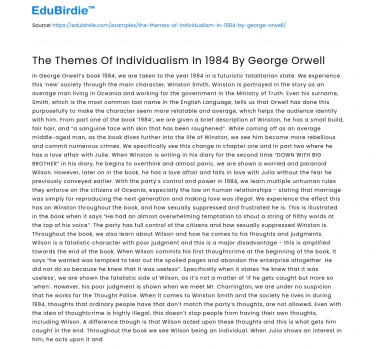In George Orwell’s book 1984, we are taken to the year 1984 in a futuristic totalitarian state. We experience this ‘new’ society through the main character, Winston Smith. Winston is portrayed in the story as an average man living in Oceania and working for the government in the Ministry of Truth. Even his surname, Smith, which is the most common last name in the English Language, tells us that Orwell has done this purposefully to make the character seem more relatable and average, which helps the audience identify with him. From part one of the book ‘1984’, we are given a brief description of Winston, he has a small build, fair hair, and “a sanguine face with skin that has been roughened”.
While coming off as an average middle-aged man, as the book dives further into the life of Winston, we see him become more rebellious and commit numerous crimes. We specifically see this change in chapter one and in part two where he has a love affair with Julie. When Winston is writing in his diary for the second time “DOWN WITH BIG BROTHER” in his diary, he begins to overthink and almost panic, we are shown a worried and paranoid Wilson. However, later on in the book, he has a love affair and falls in love with Julia without the fear he previously conveyed earlier.
Save your time!
We can take care of your essay
- Proper editing and formatting
- Free revision, title page, and bibliography
- Flexible prices and money-back guarantee
With the party’s control and power in 1984, we learn multiple unhuman rules they enforce on the citizens of Oceania, especially the law on human relationships - stating that marriage was simply for reproducing the next generation and making love was illegal. We experience the effect this has on Winston throughout the book, and how sexually suppressed and frustrated he is. This is illustrated in the book when it says “He had an almost overwhelming temptation to shout a string of filthy words at the top of his voice”. The party has full control of the citizens and how sexually suppressed Winston is.
Throughout the book, we also learn about Wilson and how he comes to his thoughts and judgments. Wilson is a fatalistic character with poor judgment and this is a major disadvantage - this is amplified towards the end of the book. When Wilson commits his first thoughtcrime at the beginning of the book, it says “he wanted was tempted to tear out the spoiled pages and abandon the enterprise altogether. He did not do so because he knew that it was useless”. Specifically when it states ‘he knew that it was useless’, we are shown the fatalistic side of Wilson, as it’s not a matter of ‘if he gets caught but more so ‘when’. However, his poor judgment is shown when we meet Mr. Charrington, we are under no suspicion that he works for the Thought Police.
When it comes to Winston Smith and the society he lives in during 1984, thoughts that ordinary people have that don’t match the party’s thoughts, are not allowed. Even with the idea of thoughtcrime is highly illegal, this doesn’t stop people from having their own thoughts, including Wilson. A difference though is that Wilson acted upon these thoughts and this is what gets him caught in the end. Throughout the book we see Wilson being an individual. When Julia shows an interest in him, he acts upon it and has a love affair with her. When he finds out about information he shouldn’t know from his work, he tries to figure it out which leads him to talk to a prole about life pre-revolution. When he buys a diary, he cannot stop himself from writing in it, committing thoughtcrime with every word. He knows all the consequences of these thoughts, yet acts upon them.
Due to his ability to question a false perception of reality created by the party and reality shows his individualism - which eventually lands him in prison to get tortured and lose a part of himself. When he says “Has it always been like this? Has food always tasted like this?”, his capability to question the party and challenge them mentally shows his individualism and sets him apart from the rest of Oceania.






 Stuck on your essay?
Stuck on your essay?

